- Home
- Janet Evanovich
Smitten - LOVESWEPT - 392
Smitten - LOVESWEPT - 392 Read online
LOVESWEPT - 392
Smitten
Janet Evanovich
One
When Lizabeth Kane was five years old she wanted to grow up to be a fairy. She wanted skin that was as smooth and white as milkweed silk. And she wanted hair that cascaded halfway down her back in a luxuriant cloud of waves and curls that shone a sunny yellow by day and silver when washed by the light of the moon. She thought she'd wear a buttercup blossom when she needed a hat, and she'd go rafting on curled magnolia leaves.
At five Lizabeth understood that she was a human child and it would take some doing to shrink herself into fairy size, but she had confidence in falling stars and wishbones and birthday candles. She knew that fairies were tiny creatures, no bigger than a man's thumb, but it seemed to her that if a girl could grow up then she could almost as easily grow down. And if she could eventually grow breasts then probably if she tried very hard she could grow wings instead. Almost all fairies had lovely gossamer wings, and Lizabeth wasn't sure how comfortable that would be when she wanted to sleep on her back or lean against the gnarled trunk of an enchanted tree to daydream. She supposed that would be part of the price she would pay for growing up to be a fairy.
In fact, that was about the only price exacted on an adult fairy, because for the most part, fairies did just as they pleased. They weren't stuffed into panty hose and sent off on a bus to earn a living staring at a computer screen. They weren't polite to incompetent employers for the sake of career advancement. And they weren't expected to prepare gourmet feasts for boring men who had only one thing on their mind . . . pot roast. Fairies were indulgent, playful creatures, and even though two decades and several years had gone by since Lizabeth first decided to be a fairy, even though Lizabeth Kane now stood five feet six inches tall in her stocking feet, even though she was now thirty-two years old—she still had aspirations of growing up to be a fairy.
She no longer cared about whittling herself down to the average fairy height of five inches, or having milkweed skin or gobs of fairy hair. Lizabeth Kane wanted the pluck, the joie de vivre, the perfect thighs of Tinker Bell. Think positive, Lizabeth told herself. If she just put her mind to it she could be plucky, she could have joie de vivre—and two out of three wasn't bad.
She folded the morning paper under her arm and looked at the half-finished house looming in front of her. She had to be positive about getting a job too. She was a single parent now, and if she didn't get a job soon, meeting her mortgage payment was going to be more elusive than obtaining Tinker Bell thighs. She read the crude "Help Wanted" sign stuck into the front yard and took a deep breath. She'd been on fourteen job interviews in the past five days and no one had even given her a second look. She was overeducated. She was undereducated. She was inexperienced. She was unskilled. She was virtually unemployable. Okay, Lizabeth, she said to herself, pulling her shoulders back, this is a new day. This is your last shot. And this is the perfect job. Perfect hours, perfect location, decent wages. Go for it! she told herself.
Matt Hallahan had been looking out of an upstairs window. He'd watched Lizabeth fold her paper and chew on her lower lip while she stared at the house. Not a buyer, he decided. Buyers came in pairs and usually had a real estate agent in tow. This woman looked as if she were peddling vacuum cleaners and he was her first customer. She was nervous, she was anxious—she was cute as a bug. Even from this distance he could see she had big blue eyes, a little nose, and lots of curly brown hair that hung almost to her shoulders. She was small-boned and slim. Not skinny. Her pink T-shirt stretched tight over full breasts and was tucked into a pair of formfitting, faded jeans. He didn't know what she was selling, but he admitted to himself that he'd have a hard time not buying it. She stiffened her spine, pushed her chin forward, and tiptoed through the mud to the front door.
"Yoo-hoo," Lizabeth called. "Anybody home?" She gasped and took a step backward when Matt appeared at the head of the stairs and ambled down to her. He was big. He seemed to fill the whole stairwell. He was half undressed, and he was gorgeous. She felt her heart slam against the back of her rib cage while she made a fast assessment. At least six feet two inches with shoulders like a linebacker and the flat stomach and slim hips of a Chippendales dancer. No shirt, cutoff jeans that rode low, a red heart tattooed on his left forearm. He had muscular legs. Great quads. And he was tan—everywhere. When she finally dragged her eyes up to his face she found he was laughing at her. Smile lines splintered from deep-set blue eyes that were shaded by curly blond eyelashes and a ferocious slash of bushy blond eyebrows. His nose was sunburned and peeling, and his mouth was incredibly tempting.
"Lord, lady," he said, "last time someone looked at me that close was when I thought I had a hernia and the doctor told me to cough."
Lizabeth felt the flush spread from her ears to her cheeks. Get a grip, she told herself. Thirty-two-year-old mothers do not blush. She'd delivered two children, she'd learned to pump gas, she'd seen Tom Cruise, Bruce Willis, and Ted Danson in their underwear. She could handle anything. She ignored his remark and plastered a smile on her face. "I'd like to speak to whoever is in charge of this construction project."
"That's me. Matt Hallahan." He held out his hand.
"Lizabeth Kane." He didn't rub his thumb across her wrist. He didn't give her an extra squeeze or prolong the contact. He just shook her hand. She liked him for that. And she liked the way his hand felt. Warm and calloused and firm. "I'd like to apply for the job you advertised in the paper."
Matt missed a beat before answering. "I advertised for a carpenter."
"Yup."
His grin widened. Life was full of nice surprises. "You have any experience?"
"Actually, I haven't done much carpentering professionally. But I've hammered a lot of nails into things—you know, hanging pictures—and once I built a dollhouse from scratch, all by myself."
The smile tightened at the corners of his mouth. "That's it?"
"I suppose I was hoping it would be an entry-level position."
"Entry level in the construction business would be laborer."
Lizabeth caught her bottom lip between her teeth. "Oh. Well then, I'd like to apply for a job as a laborer."
"Honey, you're too little to be a laborer. Laborers do a lot of carting around." He squeezed her bicep. "Look at this. Hardly any muscle at all. You probably have one of those motor-driven Hoovers."
Lizabeth narrowed her eyes. She didn't like being called a wimp. "I can do a push-up."
"Only one?"
"One is pretty good. Besides, I've just started on my exercise program. Next week I'll be up to two . . . maybe three."
"Wouldn't you rather be a secretary? You could work in a nice air-conditioned office ..."
"No," Lizabeth said firmly. "I would not rather be a secretary. To begin with, I can't type. I break out in hives when I sit in front of a computer screen. I can't do anything! You know why I can't do anything? Because when I went to college I majored in history. My mother told me to major in math, but did I listen to her? Nooooo. I could have been an accountant. I could have been self-employed. And if that isn't bad enough, I've spent the last ten years of my life reading Little Bear books and baking chocolate-chip cookies." She was pacing, flapping her arms. "Now I need a job, and I can't do anything. If I don't get a job, I can't meet my mortgage payments. My kids will starve. I heard of a woman once who got so desperate she cooked her dog." Lizabeth gave an involuntary shiver.
"You have kids?"
"Two boys. Ten and eight. You see, that's why this job is so perfect for me. I only live about a quarter mile away. I've been watching the new houses going up, and I noticed the carpenters stop work at three-thir
ty. My kids get out of school at three-thirty. I wouldn't have to put them in day care if I worked here."
He looked at her left hand. No ring. He was doomed. How could he refuse a job to a woman who was about to barbecue Spot to keep her kids from starving?
"I'm much bigger than I look," Lizabeth said. "And besides, that's another thing about the job that's perfect. It would get me into shape. And I would learn things about a house. I need to know about fixing toilets and roofs and getting tiles to stick to floors."
"How soon do you have to know all these things?"
"The sooner the better."
Matt grimaced. "Your roof is leaking? Your toilet has a problem? Your tiles are coming loose?"
"Yes. But it's not as bad as it sounds. I bought this terrific house. It was built at the turn of the century and has gingerbread trim and elaborate cornices and wonderful woodwork, but it's a little run-down ..."
"You're not talking about that gray Victorian on the corner of Woodward and Gainsborough, are you?"
Lizabeth nodded her head. "That's it. That's my house."
"I always thought that house was haunted. In fact, I thought it was condemned."
"It's not haunted. And it was only condemned because the front porch needed fixing." She paused in her pacing and looked at him. "You don't think it's hopeless, do you?"
He wasn't sure if she was talking about her house or his life after this moment. It didn't matter. The answer would be the same to both questions—yes. But he lied. "No. I think the house has . . . possibilities. It has . . . character."
Lizabeth smiled. She loved her house. It had a few problems, but it was charming and homey and just looking at it made her happy. She'd bought it in January, the day after her divorce had become final. She'd needed to do something positive. Give herself a symbolic fresh start. "Maybe you could come over sometime and take a look at it. You could give me your professional opinion on it. I'm not sure which project I should start first."
His professional opinion was that the house should be burned to the ground. He wasn't able to tell her that, though, because his heart was painfully stuck in his throat. It had happened when she'd smiled. She had the most beautiful, the most radiant smile he'd ever seen. And he'd caused it just by saying her house had character. He wondered if she would smile like that if he kissed her—if he made love to her. He lounged against the unpainted wall, his arms loosely crossed over his bare chest, and he promised himself that someday he'd take Lizabeth Kane to bed, and when she awoke in the morning, she'd open her eyes and see him lying beside her, and she'd smile.
Lizabeth saw his eyes grow soft and sexy and worried that he'd misinterpreted her invitation. She hadn't meant to be so friendly. She didn't want to imply that she'd do anything to get the job. It was just that it was difficult for her to be less than exuberant when it came to her house. And in all honesty, she might have gaped at his body a tad too long. "I didn't mean to sound so desperate for the job," she said. "This is my first construction interview, and I think I got carried away. I don't want you to hire me because you feel sorry for me with my leaky roof and two hungry kids. And I don't want you to hire me because . . . well, you know."
He raised his eyebrows in question.
Lizabeth rolled her eyes and made a disgusted sound. She was making a fool of herself. She'd approached him about a job and had ended up telling him her life story, and now she was in the awkward position of establishing sexual boundaries. She'd been separated from her husband for a year and a half and divorced for six months, but she still wasn't especially good at being a sophisticated single. It wasn't a matter of time, she admitted. It was a matter of personality. She was an impulsive, let-it-all-hang-out, emotional dunderhead. "Look," she said flatly, "I'm willing to work hard. I'm smart. I'm dependable. I'm honest." She pulled a folded piece of lined notebook paper from her pocket and handed it to him. "This is my resume. It's not much, but it has my name and address and phone number, and if you ever need a laborer you can get in touch with me."
Matt unfolded the paper and studied it, trying to keep the grin from creeping across his mouth. "This is a spelling list."
Lizabeth snatched it back and winced as she looked at it. "I took the wrong paper. This is my son's homework assignment."
"Don't worry about it. I don't need a resume. And it so happens I do need a laborer."
"You're not hiring me out of pity, are you?"
"No, of course not." That was an honest answer, he thought. He was hiring her out of lust. He didn't think she wanted to hear that, so he decided not to elaborate. "You can start tomorrow, if you want. Be here at six o'clock."
She did it! She got the job! If Matt Hallahan hadn't been so overwhelmingly virile she would have kissed him, but she instinctively knew kissing Matt Hallahan would be serious stuff. It would start out as a spontaneous act of happiness and gratitude, and it would end up as pure pleasure. A fairy wouldn't have hesitated for a second, but Lizabeth Kane wasn't a fairy. She was a mother, so she gave herself a mental hug and smiled.
Matt couldn't help smiling back. Her joy was infectious. He stuffed his hands into his pockets to keep from touching her, and wondered what the devil he was going to do with a soft, gullible, 123-pound laborer.
Jason Kane looked at his mother with the sort of cynical excitement peculiar to eight-year-old boys. "Man, this is awesome. My mom, a construction worker. You're gonna bust your buns," he said gleefully. "Those construction workers are tough. They have muscles out to here. They chew tobacco, and they have tattoos. Are you gonna get a tattoo, Mom?"
Lizabeth paused with her knife in the peanut butter jar. "Excuse me? Bust your buns?"
"That's construction-worker talk, Mom. You'd better get used to it."
Ten-year-old Billy was less enthusiastic. "You sure you can handle this, Mom? You're pretty puny. And you're old."
"I'm not that old. I'm thirty-two!" She slathered peanut butter on a slice of bread. "I'm going to be fine. I won't be far away, and I'll have a good-paying job. You two can watch television until Aunt Elsie gets here."
Their eyes opened wide. "Aunt Elsie is coming?" they said in unison.
"She's agreed to come stay with us for the summer so you won't be on your own all day."
Jason sprang out of his seat. "Mom, Aunt Elsie is a hundred years old. She talks to pigeons."
"Aunt Elsie isn't a hundred years old," Lizabeth said. She wrapped her peanut butter and jelly sandwich in a plastic bag and dropped it into a brown paper sack, along with a can of root beer and an apple. "Aunt Elsie is seventy-two and she's almost as good as new."
"They keep her locked up in a camp for old people," Billy said.
Lizabeth tossed the rest of her coffee down her throat. "I have to go. I don't want to be late the first day. And it's not a camp. It's a retirement village, and the man at the gate keeps trespassers out. He doesn't keep Aunt Elsie locked in."
Billy and Jason looked at each other as if they didn't believe her.
Lizabeth stood at the front door. "You guys know the rules. Don't open the door to strangers. Call Mrs. Fee next door if there's a problem. My work address and phone number are posted on the bulletin board in the kitchen."
Billy put his arm around his little brother. "Don't worry, Mom. I can handle it."
"Mmmmm." They were great kids, Lizabeth thought, but Jason had his "ice cream for lunch" look. Good thing Elsie said she'd be there by ten. She kissed both boys and locked the door behind her.
The morning air felt cool on her face. Birds sang. Cicadas droned. Harbingers of hot weather, Lizabeth thought, taking a moment to listen to the insects. Bucks County was lovely in the summer. Lush and green, the air fragrant with the smell of flowers, cut grass, and fresh-turned dirt. The land bordering the Delaware River was a flat, rich floodplain, steeped in history, dotted by quaint towns unmarred by shopping centers and suburban sprawl. This was where Lizabeth chose to live. Chase Mills, Pennsylvania. Seven miles from Washi
ngton's Crossing and a forty-five-minute drive from downtown Philadelphia.
Lizabeth wore jeans and a yellow T-shirt and she swung her lunch bag as she walked. The smell of coffee percolating in kitchens carried through the open windows. The newspaper boy cut through front yards, slinging his papers onto porches. Lizabeth could hear him marching up Gainsborough Drive. "Thunk," the paper would hit against a front door. A patch of silence and then another "thunk." In new neighborhoods, like the small cul-de-sac Matt was building, there would be the whir of central air conditioners. Lizabeth's street had no whirring sounds. The houses on Lizabeth's street were old, each one unique, built before the age of the subdivision, and they lacked some of the fancier amenities. The sidewalks were cracked and sometimes tilted from tree roots snaking beneath them. Houses sat back from the street, shaded by mature, thickly leaved maples and hundred-year-old oaks. Bicycles waited on wooden porches that wrapped around clapboard houses. It was a family neighborhood that was gently dealing with mid-life crises. A few homes had succumbed to vinyl siding, but as yet no one had installed a hot tub. Dogs ran loose. Lawns were trimmed but were far from manicured. There was too much shade, too many roots, too many tiny feet tramping through yards for perfect lawns. Rosebushes lined driveways and grew along the occasional picket fence.
Lizabeth walked to the end of Gainsborough Drive and turned into the new, blacktopped cul-de-sac that pushed into a small bit of woods. There were three houses under construction. There was room for four more. A plumber's truck was parked in front of the first house, which was a large colonial, almost completed. Two pickups and a jeep were parked farther down the street. A radio blared. Hammers rhythmically slammed into wood and from inside one of the houses a saw whined. Lizabeth could barely hear any of it over the pounding of her heart. She wiped sweaty palms on her jeans and tried to move forward, but her feet refused to budge. She had no business being here! She belonged back home, in her kitchen. Lizabeth, she told herself, you're a liberated woman. There's no reason for you to live your life in a kitchen. Yes there is, she silently wailed, I like my kitchen. I feel comfortable there. I know how to use a food processor. I do not know how to use a caulking gun. Okay, bottom line. She didn't get paid for working in her kitchen. But why had she chosen this? What had she been thinking yesterday? The answer was obvious. She was thinking of her kids. She took a deep breath. "Okay. I can do it," she said under her breath. "I'm ready. Come on, feet. Get going."

 Full Scoop
Full Scoop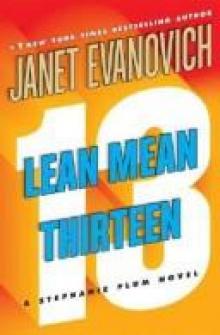 Lean Mean Thirteen
Lean Mean Thirteen One for the Money
One for the Money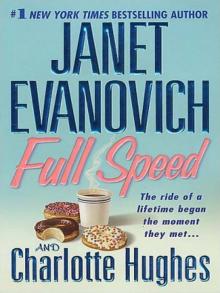 Full Speed
Full Speed Top Secret Twenty-One
Top Secret Twenty-One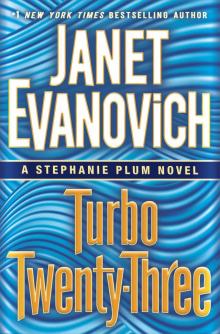 Turbo Twenty-Three
Turbo Twenty-Three Dangerous Minds
Dangerous Minds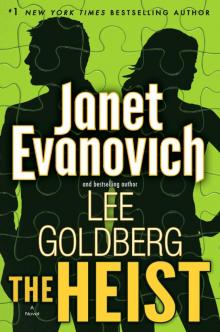 The Heist
The Heist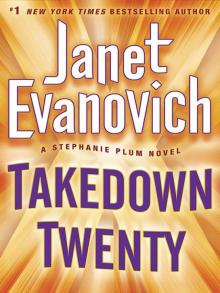 Takedown Twenty
Takedown Twenty Two for the Dough
Two for the Dough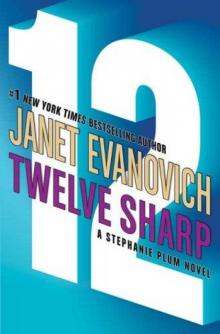 Twelve Sharp
Twelve Sharp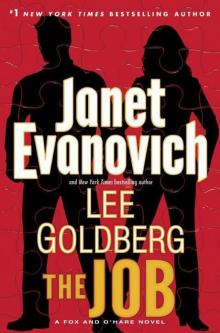 The Job
The Job Metro Girl
Metro Girl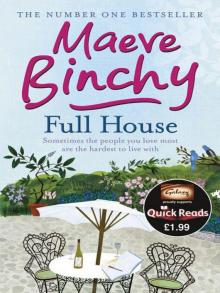 Full House
Full House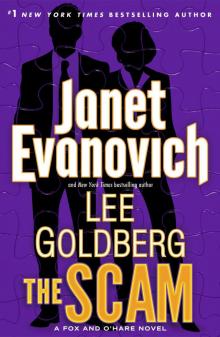 The Scam
The Scam Hot Stuff
Hot Stuff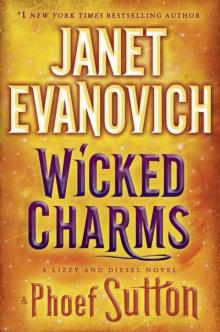 Wicked Charms
Wicked Charms Hero at Large
Hero at Large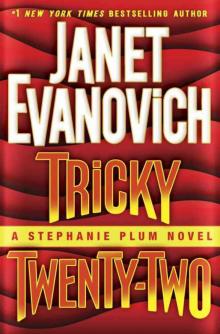 Tricky Twenty-Two
Tricky Twenty-Two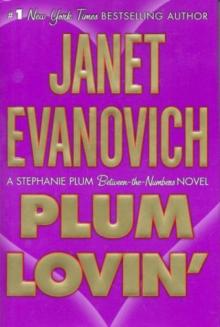 Plum Lovin'
Plum Lovin'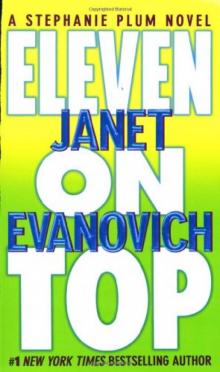 Eleven on Top
Eleven on Top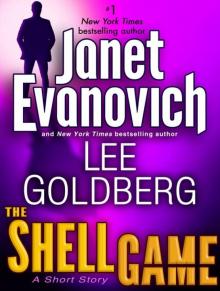 The Shell Game
The Shell Game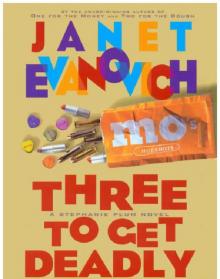 Three to Get Deadly
Three to Get Deadly Four to Score
Four to Score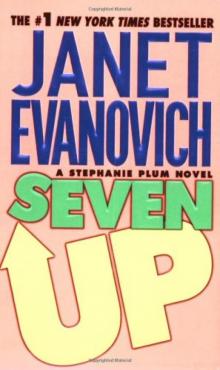 Seven Up
Seven Up High Five
High Five Hot Six
Hot Six The Grand Finale
The Grand Finale Hard Eight
Hard Eight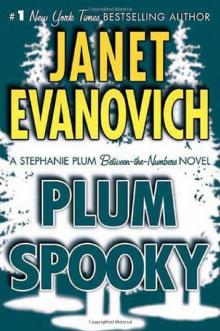 Plum Spooky
Plum Spooky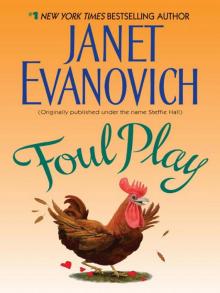 Foul Play
Foul Play Ten Big Ones
Ten Big Ones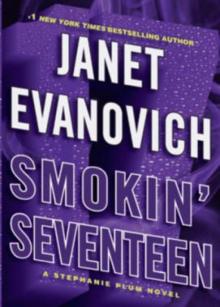 Smokin' Seventeen
Smokin' Seventeen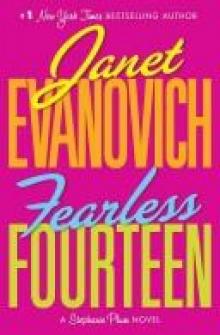 Fearless Fourteen
Fearless Fourteen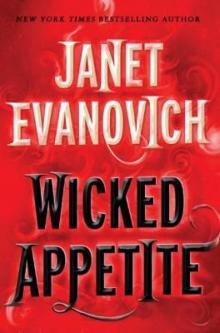 Wicked Appetite
Wicked Appetite Curious Minds
Curious Minds Sizzling Sixteen
Sizzling Sixteen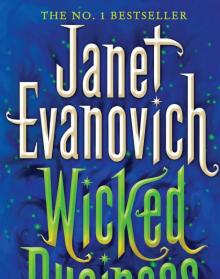 Wicked Business
Wicked Business The Big Kahuna
The Big Kahuna Explosive Eighteen
Explosive Eighteen Visions of Sugar Plums
Visions of Sugar Plums Full Blast
Full Blast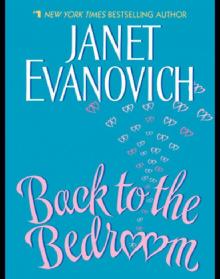 Back to the Bedroom
Back to the Bedroom Finger Lickin' Fifteen
Finger Lickin' Fifteen Smitten
Smitten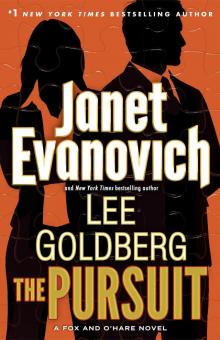 The Pursuit
The Pursuit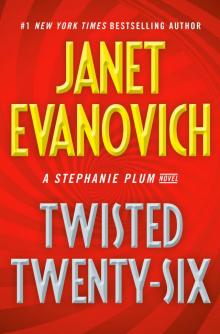 Twisted Twenty-Six
Twisted Twenty-Six Love in a Nutshell
Love in a Nutshell The Chase
The Chase Notorious Nineteen
Notorious Nineteen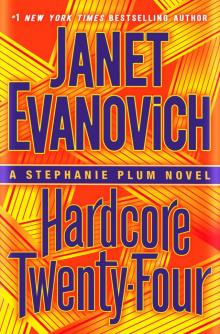 Hardcore Twenty-Four
Hardcore Twenty-Four The Rocky Road to Romance
The Rocky Road to Romance Twisted Twenty-Six (Stephanie Plum 26)
Twisted Twenty-Six (Stephanie Plum 26) Manhunt
Manhunt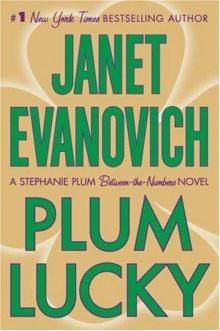 Plum Lucky
Plum Lucky Full Bloom
Full Bloom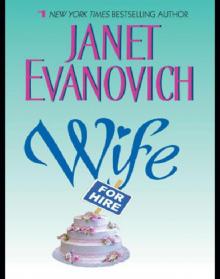 Wife for Hire
Wife for Hire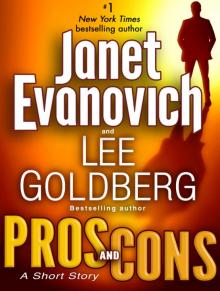 Pros and Cons
Pros and Cons Fortune and Glory
Fortune and Glory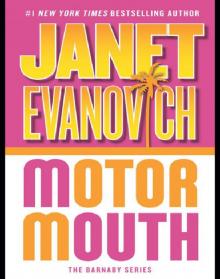 Motor Mouth: A Barnaby Novel
Motor Mouth: A Barnaby Novel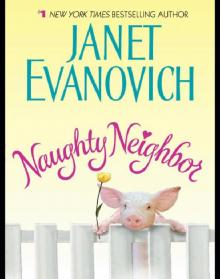 Naughty Neighbor
Naughty Neighbor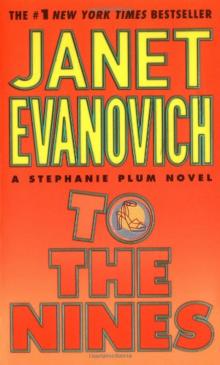 To the Nines
To the Nines The Husband List
The Husband List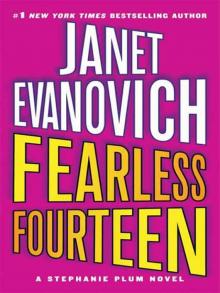 Fearless Fourteen: A Stephanie Plum Novel
Fearless Fourteen: A Stephanie Plum Novel Smitten - LOVESWEPT - 392
Smitten - LOVESWEPT - 392 Plum 12 - Twelve Sharp
Plum 12 - Twelve Sharp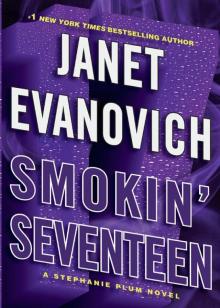 Smokin' Seventeen: A Stephanie Plum Novel (Stephanie Plum Novels)
Smokin' Seventeen: A Stephanie Plum Novel (Stephanie Plum Novels) Top Secret Twenty-One: A Stephanie Plum Novel
Top Secret Twenty-One: A Stephanie Plum Novel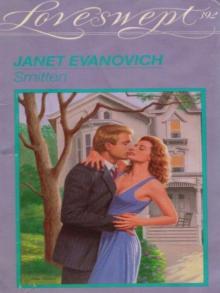 SMITTEN (Loveswept, No 392)
SMITTEN (Loveswept, No 392) Plum 10 - Ten Big Ones
Plum 10 - Ten Big Ones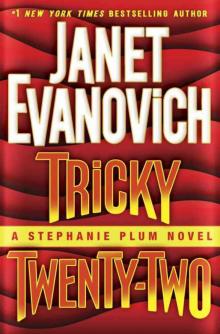 Tricky Twenty-Two: A Stephanie Plum Novel
Tricky Twenty-Two: A Stephanie Plum Novel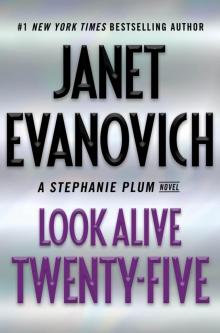 Look Alive Twenty-Five
Look Alive Twenty-Five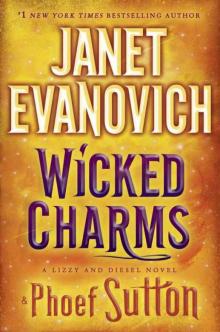 Wicked Charms: A Lizzy and Diesel Novel
Wicked Charms: A Lizzy and Diesel Novel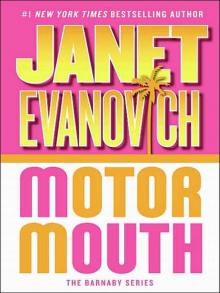 Motor Mouth
Motor Mouth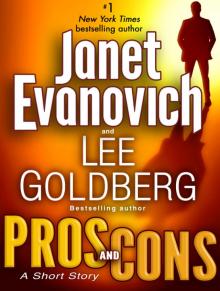 Pros and Cons: A Short Story
Pros and Cons: A Short Story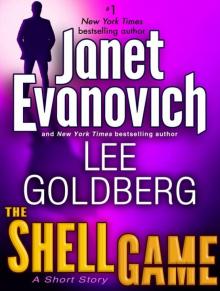 The Shell Game: A Fox and O'Hare Short Story (Kindle Single)
The Shell Game: A Fox and O'Hare Short Story (Kindle Single) Plum Boxed Set 1, Books 1-3 Stephanie Plum Novels)
Plum Boxed Set 1, Books 1-3 Stephanie Plum Novels) Between the Plums
Between the Plums